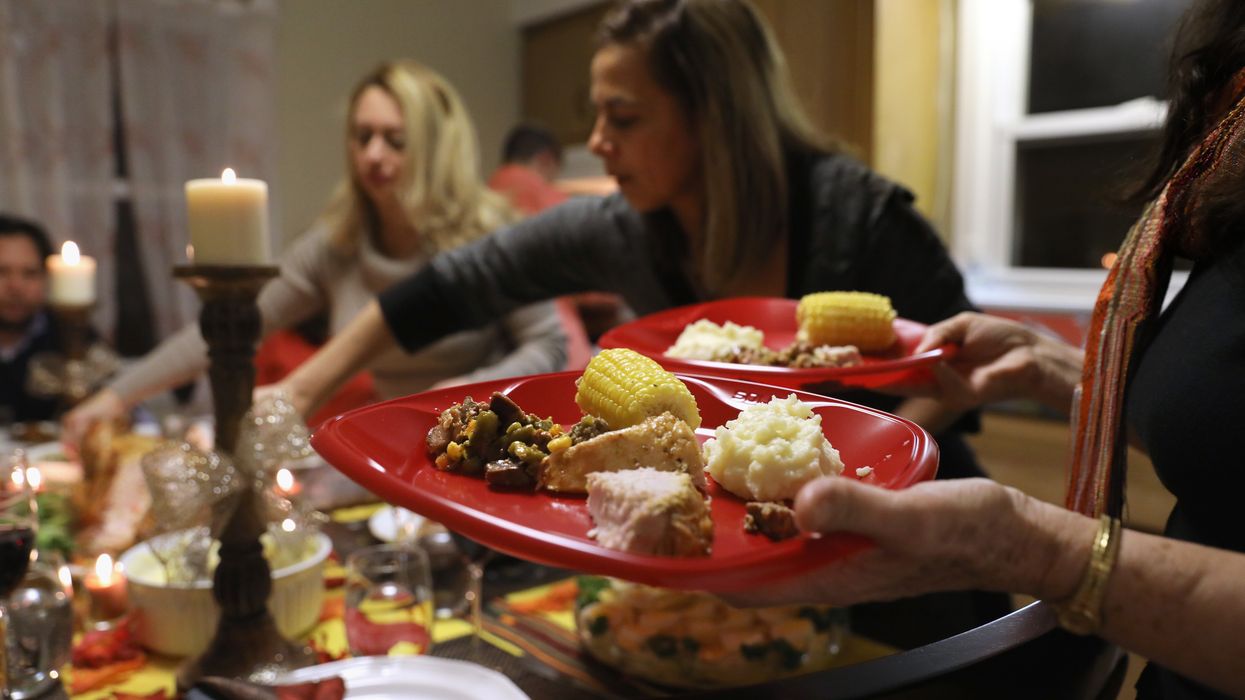Talisse is a philosophy professor at Vanderbilt University.
An internet search for "surviving Thanksgiving politics" returns more than 10 million results. The major news venues have run autumn columns on navigating political debate over Thanksgiving dinner for several years running. The advice offered is sensible: Remain calm, listen respectfully, seek common ground and so on.
But many of the most recent columns offer an additional tip. Noting that Donald Trump's presidency might have made Thanksgiving civility impossible, they suggest skipping the holiday altogether.
Something strange is afoot when America turns to journalists for advice in surviving a holiday devoted nearly entirely to eating good food. Politics has rendered Thanksgiving something to be dreaded. Given the purpose of the holiday, this is tragic. Can anything be done to save Thanksgiving from our partisan divisions?
One strategy is to adopt the adage instructing us to avoid discussing politics over dinner. This rule is rooted in the observation that differences of political opinion quickly escalate into hostility. Better, then, that they be suppressed.
There is much to recommend this policy. Yet not everyone holds to the view that politeness outranks the business of democratic citizenship. Some relatives might feel strongly that democracy is a full-time endeavor and so the struggle for decent politics must override traditional manners. According to them, however valuable a congenial holiday might be, justice is a far more important goal.
If instituted strictly for the sake of ensuring peace, the "no politics over dinner" policy compels only those who see peace as especially valuable. When Thanksgiving also involves relatives who regard politics as more important than familial harmony, the policy amounts to unilateral disarmament. That typically means that your drunk uncle gets to hold forth unopposed. One might just as well cancel.
Thus, whatever its merits may be, the "no politics over dinner" policy requires backup from considerations weightier than the desirability of a placid holiday feast.
Such considerations are found in the ideal of democracy itself. Democracy is many things, but it is centrally the ideal of self-government among political equals. The key to the democratic ideal is that citizens are empowered to hold their government and their fellow citizens accountable. This supplies an explanation of why political disputes escalate so frequently: There will always be disagreements among equal citizens. When interacting in the role of citizen, no one is another's subordinate or supervisor. Consequently, no one gets to declare for oneself the last word.
However, we do not live together solely as citizens. We are also one another's spouses, siblings, parents, friends, neighbors and co-workers. These nonpolitical relationships carry their own responsibilities and expectations. What is more, they are not always equal. In particular, families, workplaces and congregations are notorious for being hierarchically organized. When these hierarchies are nonetheless consistent with participants' status as equal citizens, they are generally unobjectionable.
Therein lies the rub. Under certain circumstances the dynamics governing our nonpolitical relationships obstruct our ability to interact as equal citizens. More specifically, there are settings where the relationships among family members preclude the kind of engagement in which all participants have equal standing. In that case the kind of discussion that is appropriate among democratic citizens cannot be enacted.
Hence the "no politics over dinner" policy finds a democratic rationale. Gatherings of extended family invoke complex relations, some of which involve forms of dependency and deference that run counter to our standing as equal citizens. When political debate is initiated under such conditions, it fails to be properly democratic because it fails to be debate among political equals. Put otherwise, in a democracy, political discussion should be engaged in spaces where participants can interact as equals. But Thanksgiving is a setting for interacting in our roles as relatives. The dynamics associated with familial relations frequently overcome the norms appropriate for individuals interacting as citizens. Consequently, even if we regard the pursuit of a more perfect democracy as imperative, we nonetheless should avoid political debate over Thanksgiving dinner. This is not simply for the sake of politeness, but also because Thanksgiving dinner is not a setting for properly democratic debate to begin with.
My new book, "Overdoing Democracy: Why We Must Put Politics in its Place," argues it is crucial — even as we ardently strive for a more perfect democracy — for us not to lose sight of the proper place of politics in our lives. To put the point crudely, when all of our social interactions are organized around political allegiances, we erode the capacities we need to perform well as democratic citizens. It might sound paradoxical, but if we want to improve democracy, we sometimes need to attend to other things. Overdoing democracy is democracy's undoing.
I mention this because none of the columns devoted to surviving Thanksgiving politics that I've seen makes the suggestion that political debate should be avoided because the dinner serves a social purpose more important than the travails of contemporary politics. This is notable because, after all, the whole point of democracy is to enable us to live lives devoted to things other than politics. Indeed, the promise of lives dedicated to projects other than democracy itself is what makes democracy so precious. Thanksgiving provides a setting in which we can do more than struggle to suppress our political differences. We can rise above them.



















